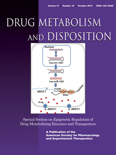
DRUG METABOLISM AND DISPOSITION
Scope & Guideline
Exploring the Frontiers of Pharmacology
Introduction
Aims and Scopes
- Pharmacokinetics and Drug Disposition:
Research articles often explore the pharmacokinetics of drugs, including absorption, distribution, metabolism, and excretion (ADME). This encompasses both in vivo and in vitro studies, utilizing physiologically based pharmacokinetic modeling to predict human responses. - Drug-Metabolizing Enzymes:
A key focus is on cytochrome P450 enzymes and other drug-metabolizing enzymes, examining their roles in drug metabolism, genetic polymorphisms, and variations in enzymatic activity across different populations. - Transport Mechanisms:
The journal highlights studies on drug transporters, including their regulation, function, and impact on drug absorption and disposition, emphasizing the interplay between metabolic enzymes and transport systems. - Toxicology and Drug Safety:
Research often addresses the toxicological aspects of drug metabolism, including the identification of metabolites that may contribute to adverse drug reactions and strategies for mitigating these effects. - Clinical Relevance and Biomarkers:
The journal emphasizes the clinical implications of drug metabolism research, including the identification of biomarkers for drug efficacy and safety, and the impact of genetic and environmental factors on individual drug responses. - Innovative Methodologies:
The use of novel experimental approaches, such as high-throughput screening, advanced analytical techniques, and computational modeling, is frequently reported to enhance our understanding of drug metabolism and disposition.
Trending and Emerging
- Precision Medicine and Pharmacogenomics:
There is an increasing emphasis on precision medicine and pharmacogenomics, as studies investigate how genetic variations affect drug metabolism, efficacy, and safety, paving the way for individualized therapeutic strategies. - Physiologically Based Pharmacokinetic (PBPK) Modeling:
The use of PBPK modeling is on the rise, allowing for more accurate predictions of drug behavior in humans based on in vitro data, enhancing the relevance of preclinical studies to clinical outcomes. - Gut Microbiome Interactions:
Emerging research on the role of the gut microbiome in drug metabolism is gaining traction, highlighting how microbial metabolites can influence drug efficacy and toxicity. - Transporter Biology and Drug Disposition:
There is a growing focus on the roles of transporters in drug absorption and disposition, particularly how they interact with metabolic enzymes and their implications for drug-drug interactions. - Innovative Drug Delivery Systems:
Research into novel drug delivery systems, such as nanoparticles and liposomal formulations, is trending, reflecting a broader interest in optimizing drug bioavailability and therapeutic outcomes. - Environmental and Dietary Influences:
Recent studies are increasingly examining how environmental factors and dietary components affect drug metabolism, emphasizing the importance of lifestyle in pharmacokinetic profiles.
Declining or Waning
- Traditional In Vitro Models:
There seems to be a waning interest in conventional in vitro models for drug metabolism, such as using only liver microsomes or hepatocytes, as researchers increasingly adopt more sophisticated systems like 3D cell cultures or organ-on-chip technologies. - Non-Cytochrome P450 Enzyme Studies:
Research specifically focused on non-cytochrome P450 enzymes appears to be less frequent, suggesting a shift towards more detailed investigations of cytochrome P450 enzymes and their interactions with other metabolic pathways. - General Drug Interaction Studies:
There is a noticeable decline in the publication of generic drug-drug interaction studies without a specific focus on mechanisms, as the field moves towards more nuanced explorations of specific pathways and genetic influences. - Animal Models for Drug Metabolism:
The reliance on traditional animal models for drug metabolism studies is decreasing, with a growing emphasis on humanized models and in vitro systems that better predict human responses. - Historical Perspectives:
Papers providing broad historical overviews on drug metabolism topics are becoming less common, indicating a shift towards more focused, cutting-edge research that addresses current challenges in drug metabolism and pharmacokinetics.
Similar Journals
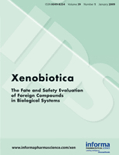
XENOBIOTICA
Innovating Insights into Chemical Substances and Life.XENOBIOTICA is a premier journal in the field of pharmacology and toxicology, published by Taylor & Francis Ltd. With an ISSN of 0049-8254 and E-ISSN 1366-5928, this journal has been at the forefront of research since 1971, providing critical insights and advancements up until 2024. It is recognized for its rigorous peer-reviewed content, occupying a third quartile ranking across various categories including Biochemistry, Health, Toxicology, and Pharmacology as of 2023. The journal serves as a pivotal platform for disseminating innovative findings that address the impact of xenobiotics on health and the environment, making it an essential resource for researchers, professionals, and students engaged in these multidisciplinary fields. While it does not currently offer open access, it is widely respected for its contribution to science, evidenced by its Scopus rankings across different areas of study. The journal encourages submissions that push the boundaries of knowledge and transform our understanding of the effects of chemical substances on living organisms.
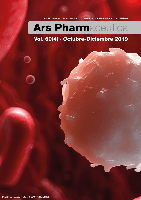
Ars Pharmaceutica
Exploring the depths of pharmacology and toxicology.Ars Pharmaceutica is a distinguished open-access journal published by UNIV GRANADA, EDITORIAL, that has been at the forefront of pharmaceutical sciences since its establishment. With ISSN 0004-2927 and E-ISSN 2340-9894, this journal aims to disseminate high-quality research in pharmacology, toxicology, and pharmaceutics, contributing to the advancement of the field. With a historical scope that spans from 1980 to 2017, it has played a pivotal role in shaping the discourse surrounding pharmaceutical science and its intersection with the arts and humanities. Although currently ranked within the 13th percentile in Scopus for Pharmaceutical Science and the 11th percentile for History and Philosophy of Science, Ars Pharmaceutica continues to uphold its commitment to academic excellence and innovation. By providing a platform for open-access research, it encourages collaboration and knowledge sharing among researchers, professionals, and students, thus enhancing the broader understanding of pharmaceutical developments and their societal implications.

DARU-Journal of Pharmaceutical Sciences
Pioneering insights in the evolving landscape of pharmaceuticals.DARU-Journal of Pharmaceutical Sciences is a leading peer-reviewed journal published by SPRINGER INT PUBL AG that focuses on the dynamic and rapidly evolving fields of pharmaceutical sciences, including drug discovery, pharmacology, and toxicology. With an impressive Q2 ranking in both Drug Discovery and Miscellaneous Medicine categories for 2023, this journal stands out as a vital resource for researchers, professionals, and students alike, offering a platform for significant contributions to the scientific community. Covering a comprehensive scope from 2000 to 2024 and indexed by Scopus, the journal ranks within the top percentile in its field, with a ranking of #66/313 in Pharmacology and #34/157 in Drug Discovery, reaffirming its impact and relevance. The journal promotes open access to foster widespread dissemination of knowledge in pharmaceutical sciences, ultimately aiming to bridge the gap between research and clinical applications. For those looking to stay at the forefront of pharmaceutical innovation, DARU represents an invaluable connection to the latest studies and breakthrough findings.

Clinical Pharmacology in Drug Development
Empowering professionals with cutting-edge pharmacological insights.Clinical Pharmacology in Drug Development, published by WILEY, is a distinguished journal dedicated to advancing the field of pharmaceutical science and drug development. With a strong commitment to disseminating cutting-edge research, this journal serves as a crucial platform for professionals, researchers, and students aiming to enhance their understanding of pharmacological principles and innovations in medical therapeutics. Since its inception in 2012, the journal has consistently maintained a noteworthy presence in the academic community, currently achieving a Q2 ranking in both Pharmaceutical Science and Medical Pharmacology categories as of 2023. Although the journal operates under a subscription model, it is highly regarded for its rigorous peer-reviewed publications, offering insights into drug efficacy, safety, and regulatory challenges. Positioned at the intersection of clinical practices and pharmaceutical advancements, Clinical Pharmacology in Drug Development plays an essential role in bridging the gap between scientific research and real-world application, ensuring that the latest therapeutic strategies are optimized for patient care.

CANCER CHEMOTHERAPY AND PHARMACOLOGY
Unveiling the future of oncology through rigorous pharmacological research.Cancer Chemotherapy and Pharmacology, published by Springer, is a leading peer-reviewed journal that plays a crucial role in the field of cancer research and drug therapy. With an ISSN of 0344-5704 and an E-ISSN of 1432-0843, this journal has been a cornerstone of oncology and pharmacology research since its inception in 1978, with continued relevance through to 2024. The journal holds a commendable Q2 ranking in categories such as Cancer Research, Oncology, and Pharmacology (medical), while achieving an elite Q1 status in Toxicology, reflecting its high-impact contributions to the scientific community. Researchers and professionals benefit from access to cutting-edge studies, insightful reviews, and innovative methodologies, making it a vital resource for anyone working at the intersection of pharmacology and oncology. Although not an open-access journal, Cancer Chemotherapy and Pharmacology remains highly accessible through institutional subscriptions, ensuring it reaches a broad audience dedicated to advancing cancer treatment and patient care.
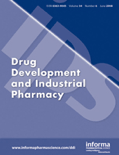
DRUG DEVELOPMENT AND INDUSTRIAL PHARMACY
Unveiling Breakthroughs in Pharmaceutical ScienceDrug Development and Industrial Pharmacy is a prestigious journal published by Taylor & Francis Ltd, focusing on the critical field of pharmaceutical sciences. With an ISSN of 0363-9045 and an E-ISSN of 1520-5762, the journal has been an essential resource for researchers and professionals since its inception in 1974. It occupies a crucial niche within Drug Discovery, Organic Chemistry, and Pharmaceutical Science, currently ranked in the second and third quartiles, reflecting its solid contribution to the field. The journal encompasses a wide array of topics, including drug development processes, formulation, and industrial manufacturing alongside cutting-edge research in pharmacology and toxicology. With a commendable Scopus ranking demonstrating high relevance—ranked #44 in Pharmaceutical Science—it serves as a vital forum for academia and industry to share innovative findings and methodologies. While it does not offer open access, the journal remains an invaluable resource for those seeking to advance their knowledge and enhance their research in pharmaceutical development.

International Journal of Pharmacology
Empowering Scholars to Shape the Future of PharmacologyWelcome to the International Journal of Pharmacology, a key publication in the field of pharmacology, published by ASIAN NETWORK SCIENTIFIC INFORMATION (ANSINET). Since its inception in 2006, this journal has provided a vital platform for researchers and professionals to disseminate their findings and insights in pharmacology, toxicology, and pharmaceutics. Despite recent discontinuation in Scopus coverage, the journal's dedication to fostering scientific dialogue continues to attract contributions from esteemed scholars globally. With an **ISSN of 1811-7775** and **E-ISSN of 1812-5700**, the journal seeks to bridge the gap between laboratory research and clinical application, promoting a deeper understanding of drug actions and interactions. Although it operates under traditional access options, the relevance of its published studies to ongoing pharmacological research remains significant.
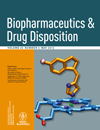
BIOPHARMACEUTICS & DRUG DISPOSITION
Advancing the Science of Drug DispositionBIOPHARMACEUTICS & DRUG DISPOSITION, published by WILEY, is a prominent journal in the fields of biopharmaceutics and pharmacology, dedicated to the dissemination of vital research that spans from the foundational aspects of drug disposition to advanced therapeutic developments. Since its inception in 1979, this journal has established itself as a crucial resource for a diverse audience, including researchers, professionals, and students. With its impact factor indicating solid performance and a current ranking in Q2 for Pharmaceutical Science and Q3 across miscellaneous medicine categories, BIOPHARMACEUTICS & DRUG DISPOSITION serves as a nexus for innovative studies and breakthrough findings. The journal's comprehensive scope ensures that rigorous scientific inquiry is represented, helping to advance the understanding of drug behavior in biological systems. Participating in this scholarly dialogue not only enhances individual knowledge but contributes to the broader pharmaceutical and medical communities, making it an essential publication for all stakeholders interested in drug development and utilization.

BASIC & CLINICAL PHARMACOLOGY & TOXICOLOGY
Delivering High-Impact Research for Healthcare ProfessionalsBASIC & CLINICAL PHARMACOLOGY & TOXICOLOGY, published by WILEY, serves as a vital resource in the fields of medicine, pharmacology, and toxicology. With an ISSN of 1742-7835 and E-ISSN 1742-7843, this journal has established a robust reputation, reflected in its Q2 classification across its categories in 2023. It aims to disseminate high-quality research and reviews that bridge the gap between basic scientific findings and clinical applications. Operating from the United States with an address at 111 RIVER ST, HOBOKEN 07030-5774, NJ, this journal focuses on the intersection of drug action and toxicity, making it an essential platform for researchers, healthcare professionals, and students. With a converged publication timeline from 2004 to 2024, BASIC & CLINICAL PHARMACOLOGY & TOXICOLOGY continues to make significant contributions to understanding pharmacological treatments and toxicological challenges. Open access options are available to broaden the reach and impact of its published work.

ASSAY AND DRUG DEVELOPMENT TECHNOLOGIES
Empowering Insights in Assay Technologies and TherapeuticsASSAY AND DRUG DEVELOPMENT TECHNOLOGIES is a peer-reviewed journal published by Mary Ann Liebert, Inc., focused on the innovative fields of pharmacology and drug development. With its ISSN 1540-658X and E-ISSN 1557-8127, the journal has successfully contributed to the scientific community since its inception in 2002, converging into one comprehensive resource by 2024. Positioned in the Q3 quartile for Drug Discovery and Q4 for Molecular Medicine as per the 2023 rankings, the journal is dedicated to disseminating cutting-edge research that addresses the complexities of drug assay techniques and their implications in therapeutics. Although currently not an open-access publication, it offers significant insights and findings valuable to researchers, professionals, and students in the realm of biochemistry and pharmacology. With a commitment to advancing knowledge and innovation, ASSAY AND DRUG DEVELOPMENT TECHNOLOGIES continues to be an essential platform for the latest advancements in drug discovery and development.